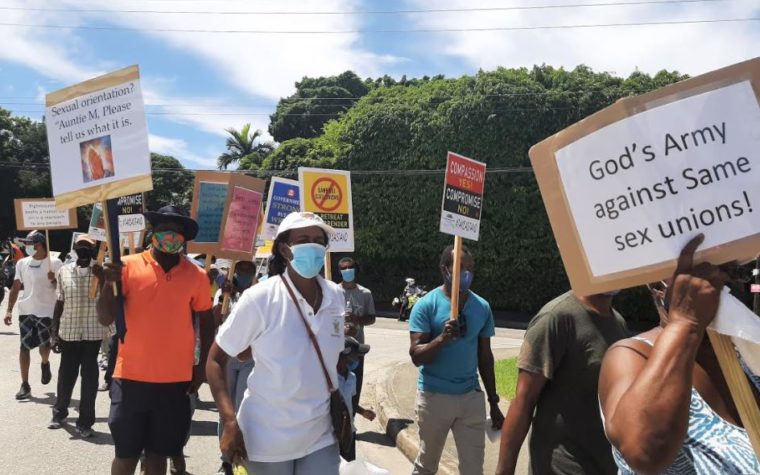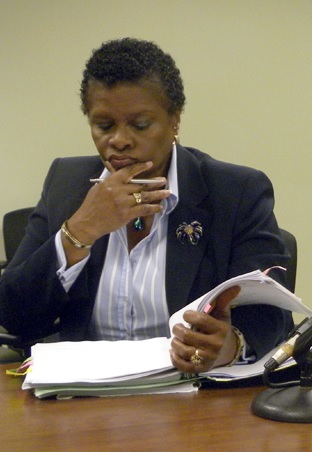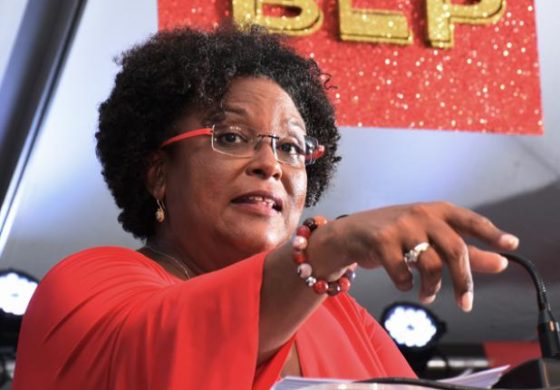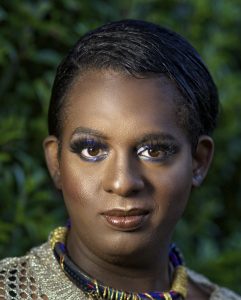Barbados commentary: Same-sex marriage protesters should go home
Colin Stewart is a 45-year journalism veteran living in Southern…
Opponents of same-sex marriage are staging weekly protest marches at a series of locations in Barbados, spurred on by the suggestion that the government is considering recognising same-sex civil unions. In this commentary, LGBT rights activist Alexa D.V. Hoffman says the protesters are raising a stink about something that is none of their business.

COMMENTARY
By Alexa D.V. Hoffmann

On Sept. 15, Dame Sandra Mason, the Governor General of Barbados, gave a Throne Speech to mark the reopening of Parliament. In it, she stated that the Government was considering implementing and recognising same-sex civil unions, although she stopped short at giving a nod to same-sex marriage, stating emphatically that her government wouldn’t allow it, but would rather let the public decide by a referendum vote. The response was nothing short of surprising.
The promise of a referendum has been causing Evangelical mouths to water, as they wish to officially register their discontent with finality, and see that no such policy ever comes about, whether for a civil union or a marriage between individuals of the same sex.
Almost immediately, the conservative religious group Family-Faith-Freedom started organising weekly marches, encouraging the public to come out and show their disdain for any acknowledgement of same-sex civil unions or marriages.

On Saturday, Oct. 17, a throng of more than 200 people took to the streets in Holetown, St. James (the westernmost city in Barbados), bearing placards such as “I got the vote, so watch me! No to same-sex unions” and “Sexual Orientation? Auntie M, tell us what it is.” (“Auntie M” is a nickname for Prime Minister Mia Amor Mottley.)
In spite of the fact that Barbados is still in the throes of the Covid-19 pandemic and temperatures have been easily creeping past 30 degrees Celsius, offering an unbearable heat, these individuals are willing to go out of their way every Saturday afternoon for the next few weeks to profess what they believe is the core of their religious beliefs.
There are at least two problems with the whole show, though. Firstly, the Barbadian public have absolutely no right to a referendum vote of the kind which the Governor General promised us. The subject matter is not even one which the public needs to be consulted on, as it has absolutely no bearing or impact on how they will be able to go about their lives on a day-to-day basis.
Their knowledge that two men or two women can officially become married or otherwise engaged in a civil union will not affect their ability to go to work, earn a living, pay bills, taxes or go grocery shopping. It will not even affect the quality of law enforcement or the ability for the Royal Barbados Police Force to do its job. It will not create any noticeable change in the quality of education their children will receive, even if Health and Family Life Education classes took on Comprehensive Sexual Education elements to account for the fact that families headed by same-sex couples exist, or that the taboos around divergent sexual orientation and gender identity are beginning to fade away.
The only purpose which the referendum vote would serve is simply to see who likes the idea and who dislikes it. For the Government of Barbados to then allow itself to be influenced by the outcome of that vote, especially in a situation where a pronounced rejection of such diversity is being manifested, and decide, “Well, since so many people are against it, we will not implement these changes even though the changes had no real, measurable effect on them anyways,” is not only folly, but it spits in the face of everyone’s human rights, including the rights of those same people who reject the proposals.
Secondly, civil unions and marriages, whether between the same sex or opposite sexes, are not the exclusive domain of religious entities. In fact, under our current laws, the religious entities have little control over the process, other than whether they wish to solemnise a marriage or not, and presently nobody is insisting that these entities are obligated to solemnise a same-sex marriage or civil union. Their right to refuse to do so still stands under the law, and I expect it will remain unchanged if civil unions and marriages for same-sex couples came to pass.
Marriages and civil unions are civil contracts, hence when a marriage must come to an end, there are divorce proceedings handled by a court of law and not by a church or other religious organisation.
The State controls the concept of marriage, and only allows the religious organisations to retain their roles in a purely ceremonial and aesthetic fashion. Furthermore, the State determines who can and who cannot be a marriage officer – that is, the individual who officially solemnises a marriage or other union. In outlining who can become a marriage officer, the State has also outlined that its own judicial officers (magistrates, judges, etc.) can also solemnise these unions, and so if a private, religious entity designated as a marriage officer refuses, the option is still on the table to have a magistrate solemnise them if no other willing private entity could be found.
Likewise, each of the 49 churches whose members reportedly participated in Saturday’s protest march would not be obliged to solemnise a future State-authorized marriage between two people of the same sex. In other words, the protesters really have no reason to march, because what they’re opposing would have no effect on them.

Barbadian trans advocate Alexa D. V. Hoffmann is the founding director of Trans Advocacy & Agitation Barbados (TAAB), chairwoman of the United Caribbean Trans Network (UCTRANS) and a member of the Latin American and Caribbean Network of Trans Persons (RedLacTrans). In 2018, she and two other Barbadian activists launched a legal challenge against the nation’s anti-sodomy law.
Related articles:
- Barbados clings to anti-LGBTI bias, but tries to look progressive (
- Barbados tells bosses it’s OK to fire trans workers without cause
- Trans Network to Barbados: We need protection (August 2020, 76crimes.com)
- Barbados legislates anti-trans bigotry(July 2020, 76crimes.com)
- Barbados: Why delay LGBTI workplace bias law? (1st of 2) (July 2020, 76crimes.com)
- Barbados: Why delay LGBTI workplace bias law? (2nd of 2) (July 2020, 76crimes.com)
- Barbados: Come for the beaches, stay for the life sentence (July 2020, 76crimes.com)
- A Barbados welcome for everyone but LGBTQ couples (July 2020, 76crimes.com)
- Three betrayals by three powerful Caribbean women (July 2020, 76crimes.com)
- This blog’s archive of articles by and about Alexa D.V. Hoffmann.





These people should respect people’s culture for once.